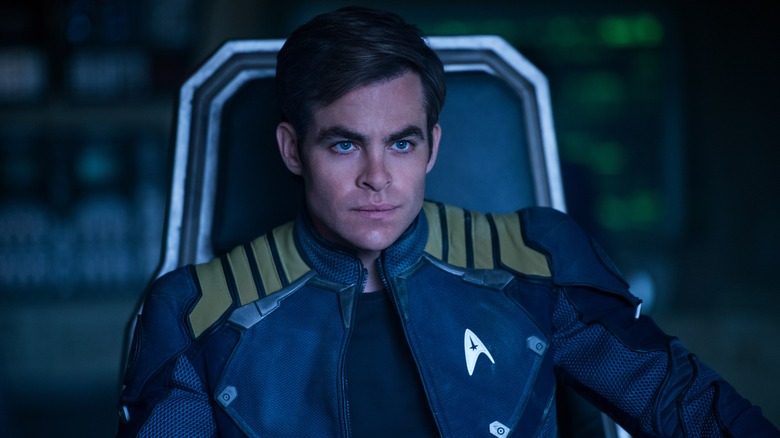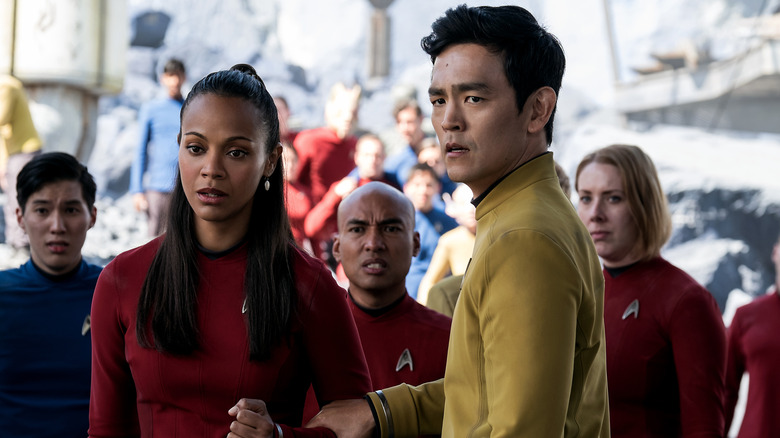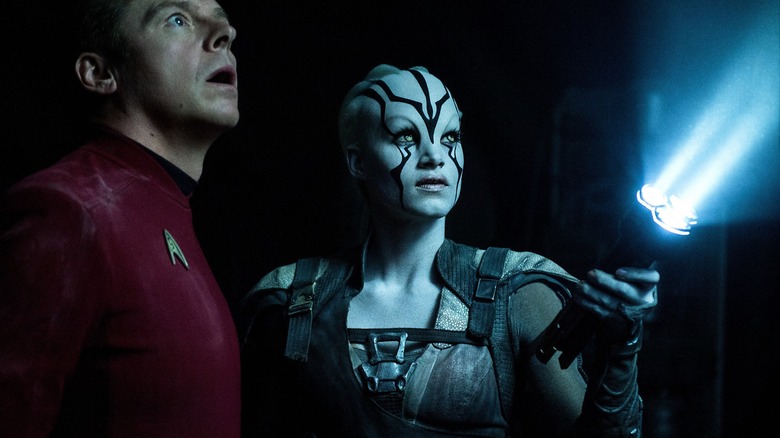Chris Pine Doesn't Think Star Trek Has Any Business Competing With Marvel
Nothing's a surefire bet in Hollywood until it is. Few took "Star Wars" seriously until it forever changed the movie landscape in 1977, ushering in our modern blockbuster era. Many were just as skeptical of the very concept of the Marvel Cinematic Universe, right up until "The Avengers" became the highest-grossing non-James Cameron movie ever at the time of its release in 2012. But when it did, you can bet your bottom dollar studios did everything in their power to replicate that success as quickly as possible — and you can be just as well-assured that the outcome was often more regrettable than not.
Sequels like Sony's "The Amazing Spider-Man 2" and Warner Bros.' "Batman v Superman: Dawn of Justice" were hastily rejiggered into launchpads for shared universes to noticeably sloppy results. Universal even announced its 2017 reboot of "The Mummy" would give rise to a retooled version of its classic monster franchises before the movie had actually come out, culminating with the fiasco that was (or should that be never was?) the Dark Universe. Still, perhaps the most insidious consequence of the so-called Marvel effect was the way it contributed to the inflation of your average tentpole budget.
Obviously, this wasn't solely Marvel's doing. Budgets were on the rise well before Earth's Mightiest Heroes joined forces for the first time in live-action. Consider the "Star Trek" movies. Typically upper-mid-budget films (at most), the franchise went very big, very fast, with its 2009 reboot costing $150 million — two and a half times that of its immediate predecessor, 2002's "Star Trek: Nemesis." Hoping to compete directly with the MCU, Paramount only continued to accelerate things from there, with 2016's "Star Trek Beyond" costing a whopping $185 million.
That was a mistake, as Chris Pine could tell you.
Star Trek's not built for that
Chris Pine, who played James Tiberius Kirk in the "Star Trek" reboot timeline (better known to Trekkies as the Kelvin Timeline), knows from first-hand experience just how ill-advised that strategy was. "I'm not sure 'Star Trek' was ever built to do that kind of business," he told Esquire in March 2023 (via Variety).
To the actor's point, 2013's "Star Trek Into Darkness" remains the property's highest-grossing film ever with a worldwide take of $467 million. "Star Trek Beyond" needed to hit a similar mark or higher to justify Paramount's spending. That would've been hard enough even if "Darkness" hadn't ticked off Trekkies something fierce with its white-washed rehashing of "The Wrath of Khan." That "Beyond" also had the misfortune of debuting on the heels of numerous summer releases that had managed to bomb with both critics and general audiences ("Alice Through the Looking Glass" and "Independence Day: Resurgence" being two such examples) didn't do it any favors, either.
It's a shame, too. "Beyond" was largely heralded as an admirable marriage between the optimistic and progressive sci-fi storytelling that had characterized old-school "Trek" and the more spectacle-oriented approach favored by the earlier Kelvin Timeline films. Had it cost half or perhaps two-thirds of what it did, it would've been a financial success. Even in 2016 dollars, $110 million could still get you a sci-fi movie as visually impressive as "Passengers." (Look at that — we managed to defeat the "Say Something Nice About 'Passengers'" challenge without breaking a sweat!)
Instead, Paramount way over-spent on "Beyond" and the movie was unable to recuperate its costs, "only" grossing $343 million. That the studio also jumped the gun and announced "Star Trek 4" ahead of the film's release was only more egg on its face.
Stick with the fan group you have
This misguided notion of trying to turn "Star Trek" into a Marvel-style crowd-pleaser is all the stranger in light of the property's long history. When yours truly was in college, they even took a class on cult TV shows where the professor framed "The Original Series" as being one of the pioneers of cult television (along with other '60s TV series like "The Prisoner"). "Trek" has always been about the minutiae of its universe, from the customs and biology of its non-human races to the Federation's tactics for diplomacy and Starfleet protocol. So long as you embrace these core ideas, Trekkies are typically happy to follow you wherever you want to take them. Why go overboard on set pieces and production values in the hopes of luring in those who're otherwise not interested in Trekking?
Chris Pine, it seems, would agree with me. "I always thought, 'Why aren't we just appealing to this really rabid fan group and making the movie for a good price and going on our merry way, instead of trying to compete with the Marvels of the world?'" he told Esquire. Paramount, for its part, has back-burnered plans for a fourth film set in the Kelvin Timeline for the moment and is now focusing on the next phase of its successful "Star Trek" series for Paramount+, which will include tie-in movies. Overall, the property has flourished from this return to television and mid-budget features, both creatively and from a business perspective. One merely hopes it doesn't forget the lessons it learned from chasing the Marvel train going forward.


